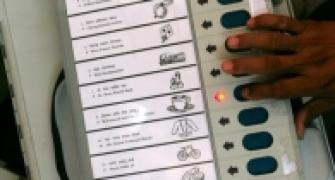 For years, growth in the telecom sector masked the fact that sector policy was arbitrary and changed at the drop of a hat.
For years, growth in the telecom sector masked the fact that sector policy was arbitrary and changed at the drop of a hat.
Growth has now plateaued. So, the negative impact of ill-conceived policy is more apparent.
In 2000, there were less than 50 million telecom subscribers -- wireless and wireline.
Now, there is close to 900 million.
Subscriber numbers have reduced through last year according to Trai’s latest report.
In December 2012, there were 895 million subscribers (wireline plus mobile), down from 937 million in September 2012, and down from 922 million in December 2011.
Every operator is faced with some demand or other.
Over Rs 20,000 crore (Rs 200 billion) of penalties and demands are under legal dispute.
(This excludes Vodafone tax case).
That is roughly 15-20 per cent of annual revenues.
The under-valuation of 2G licences in 2008 caused distortions in operating dynamics and valuations at subsequent spectrum auctions. Given cheap 2G spectrum, operators focussed on price-wars in the voice segment.
Their reluctance to invest in marketing data services and pushing the mobile internet is hurting them now.
Subsequent auctions have raised much less than the government projected.
Operators also have trouble raising money to rollout new networks.
Most 3G and 4G rollouts are stalled, with policy confusion about the usage of both technologies to boot.
Most operators seem to have decided not to rollout 3G/4G until there is policy clarity and visible demand.
This is a chicken and egg situation, since demand will not be visible until there are reasonably priced 3G/4G services available.
Part of the subscriber reduction is due to operators removing inactive connections. Earlier policy encouraged inflating subscriber numbers to garner more spectrum.
But overall teledensity has dropped in every circle except J&K.
The financial picture is gloomy. repaid ARPUs rose from Rs 81 in Q2, to Rs 83 in Q3, whereas post-paid ARPUs grew from Rs 518 to Rs 527.
ARPU for CDMA increased from Rs 78 in Q2, to Rs 80 in Q3.
Prepaid CDMA ARPU increased from Rs 48 to Rs 49, while post-paid actually dropped from Rs 454.37 to Rs 447.72
Monthly minutes of usage per subscriber for GSM increased from 342 minutes in Q2, to 359 in Q3.
Prepaid MoUs increased from 321 to 338, while post-paid MoUs decreased from 960 to 953. Texts per subscriber per month increased from 36 to 38.
The corresponding CDMA MoUs increased from 225.22 in Q2 to 230.06 in Q3.
Texts declined from 25 to 21. Broadband wireline subscribers increased from 14.68 million in Q2 to 14.98 million in Q3, emphasising the shift in off-take.
According to a report by Fitch, Indian networks are very clogged with three times as many users to bandwidth compared to China or Indonesia.
This is no surprise -- 'network problem' has become a standard phrase in every Indian language.
Indian operators' combined 2013-14 capex guidance amounts to about 19 per cent of expected revenues, versus capex of around 30 per cent for China and Indonesia.
This is partly an issue with high interest rates and other financing difficulties.
It is also due to policy uncertainty in 3G and 4G. The dispute over intra-circle roaming in 3G, and yes/no flip-flops in policy about re-farming and allowing voice over 4G have also contributed to delays.
However, the exit of multiple 2G operators has helped consolidation.
Voice tariffs have been hiked, free minutes and discounts have reduced.
There is less churn.
This means operators must spend less to attract or retain subscribers.
Just four of the existing 10 operators are making operating profits. Maybe the others will be bought out.
The presence of BSNL and MTNL -- both loss-making PSUs -- further complicates things.
It is likely that both will continue to operate and bleed ad infinitum, rather like Air India in aviation.
Should one invest at this juncture? Policy uncertainty is liable to continue.
Not much will get done until the next Lok Sabha polls and who knows what will happen then?
The potential for further mess has not been fully discounted by the market.
There should be very high share price volatility.
Three stocks (Airtel, Idea and Rcom) offer high leverage via the derivatives segment.
A trader who gets on the right side of short-term trends could make a vast amount of money here, even if the sector goes down the tubes.










